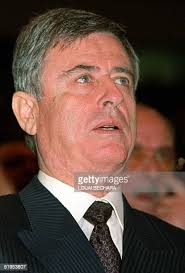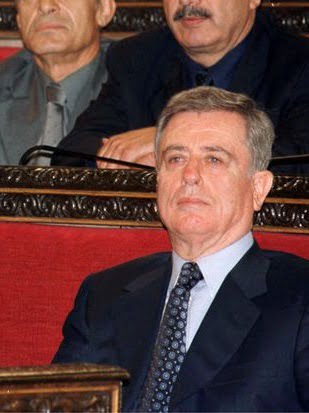The Vice President of the Republic of Syria, Abdel Halim Khaddam, warned that the world has entered a new world war that knows its beginning but does not know its end
He said that the events of September 11 in New York and Washington had a negative impact on the Arab region and its problems.
He added that one of the effects of this war was the adoption of United Nations Security Council Resolution 1373, which was adopted in a tense atmosphere. It gives any country the right to take military action against another country if there are suspicions that there are perpetrators who have acted against it in its territory. He said this resolution is an emergency law for the world, especially since it is not comparable to other Security Council resolutions. It was adopted in accordance with Chapter VII and is thus binding on the basis of action. The measures, including military action, warned that this resolution gives Israel a legitimate cover to attack any Arab country under the name of fighting terrorism. In his meeting with a number of Arab journalists and writers visiting Syria on the occasion of the 31st,
Anniversary of the Corrective Movement, Khaddam affirmed that Syria condemns the terrorist attacks in the United States of America. At the same time, he referred to Israel’s state terrorism that the world cannot stop, stressing that his vision Syria is based on the need to respect the resolutions of international legitimacy. The phase in which the world currently finds itself is not a phase of military wars. He called for mobilizing Arab forces to meet the challenges. He stressed that there is no other way than that of building a new Arab system and that the Arab countries should support the Secretary General of the Arab League to help him build this system that can achieve the minimum necessary to mobilize the Arab forces.
Commenting on the calls by some Western countries for the establishment of a Palestinian state, Khaddam said that while these are welcome promises, they are only verbal promises that are not based on a clear and concrete vision and have no timetable. He said that the promises of the twentieth century, from the promise of Western countries to Sharif Hussein to establish an Arab state if an agreement is reached on the Sykes-Picot Agreement, to the promises that flooded the Arab region after the Iraqi invasion of Kuwait, came to nothing.
Regarding the threats against Hezbollah, the Vice President of the Syrian Republic said that Hezbollah does not mean Hezbollah itself, but Syria. We are dealing with this matter in light of our interests and our sovereignty. If words are followed by deeds, we will defend ourselves with the means at our disposal. I believe that there will be no military action against an Arab state, because any military action against an Arab or Islamic country will have serious regional and international repercussions.
On the possibility of Syria’s participation in the Islamic forces maintaining security in Kabul after the fall of Kabul, Khaddam said that we are not dealing with this issue, it has not been presented to us and we will not accept it.
Khaddam stressed that Syria considers the West’s promises to establish a Palestinian state incomplete. He said that the issue now is the establishment of a Palestinian state, but no state, no borders and no sovereignty. How can there be an agreement between two parties: a party that has all the means of power and a party that has only the will to resist, to fight and to martyr? He stressed that as long as the Arab situation is not corrected, the Arab nation cannot make any real gains in the conflict with Israel until the Arab situation is corrected.
As for relations with the Palestinian Authority and the visit of its President Yasser Arafat to Syria, Khaddam said that the Palestinian Authority President’s visit to Damascus had already been arranged and a date set. After waiting for him, he received an appointment came to him with Peres. He decided to cancel his visit to Syria and meet with Peres.
He added that in Syria we are connected to the Palestinian cause, which is our national cause, regardless of who the leaders are. Khaddam denounced the widespread rule that Arab capitals approve what the PLO approves in order to increase security. He said, ” If we, like the Arab countries, are unable to confront Israel, can the PLO confront Israel alone? Khaddam stressed that the national dimension of the Palestinian cause must be restored, recalling that when the Palestinians went it alone, they ended up with the Oslo Accords, which only resulted in the PLO recognising Israel’s legitimacy.
Khaddam stated that Syria has been working to bring Egypt and Iran closer together. He said Syria has made progress in this area, but ruled out the formation of an alliance between Syria, Egypt, and Iran. He said such an alliance would not only ignore influential regional forces in the region, but also would not help achieve Arab goals
At the same time, he called for building special Arab-Iranian relations for the benefit of both sides and praised Iranian President Khatami’s early initiative for a dialogue between civilizations as an alternative to the idea of a clash of civilizations.
Regarding the Palestinian Intifada, Vice President of the Republic of Syria Abdel Halim Khaddam called for supporting and promoting it. It is the force and the tool that the Arab region has now. He said that the conflict between us and Israel has always been a struggle of power against strength An aeroplane against an aeroplane.
We have never been able to be ahead of Israel in terms of armaments and international support. The importance of the Intifada lies in the fact that it used a weapon that Israel does not have, namely the weapon of resistance and the will to bear witness. It has been shown that Israel cannot resist this weapon. One still remembers the experience in southern Lebanon, one still remembers when the demand for withdrawal from southern Lebanon became the common denominator of all Israeli forces and parties
Do not forget that there is an Israeli association, the Association of the Four Mothers, which advocated in Israeli society for withdrawal from Lebanon. This was a turning point in the Arab-Israeli conflict.
It is necessary to support the Intifada and have a lot of patience. Khaddam stressed the need to distinguish between resistance to the occupation and terrorism. In a situation like the Arab-Israeli conflict, he said, Israel is supported by the United States and the international community, has military and economic superiority, refuses to implement internationally legitimised resolutions, and is not subject to international pressure. How can this be resisted, and how can a people liberate their country?
Khaddam called for lifting the siege on Iraq and bringing the country back into the ranks of Arab countries, highlighting the position of Syria, which, in line with the Arab consensus, rejects any military action against Iraq as part of the so-called campaign against terrorism. Khaddam pointed out that some Arab countries have agreed to participate in various forms in the operations of the coalition against terrorism in order to alleviate the embarrassment of Arab countries and mitigate the negative impact of the September events on the Arab region
. He called for joint and intensive Arab efforts to develop a specific definition of terrorism that is approved, recognised and followed by the international community
Regarding the effectiveness of the European Union’s role, he said it is becoming increasingly aware of the seriousness of the situation in the region and its impact on its interests
Therefore, it is focusing its efforts on the need to find a final solution to the conflict to protect its interests, but it is trying to maintain a state of balance. Khaddam pointed out that in theory Europe can put pressure on Israel, since 60% of Israel’s trade is with Europe, but in practice Europe cannot do so because it is closely tied to the United States of America.
Regarding the internal situation in Syria, the Vice President of the Syrian Republic referred to a new government currently under consideration under the leadership of the ruling party and stated that this government will have the task of leading a major development project and a hopeful economic renaissance. It will implement an extensive program to expand the capacity of the government, the judiciary and the education system
Abdel Halim Khaddam gave a quick review of the past 30 years since the establishment of the corrective movement and said that its celebration is not a celebration of a past phase, but a celebration and a talk about an experience in its forms and implications. The essence of the correction movement is change, but not changing people and leaders, but changing concepts and culture.
He reviewed the achievements and disadvantages of the past period, explaining that there were changed visions both at home and abroad. He said that before the correction movement, our Arab relationship was based on a theoretical understanding
All those who did not share our concepts were considered an opponent. Our Arab relationship was frozen, which led us to engage in marginal battles and weakened our capabilities. However, after the correction movement, we considered Arab solidarity to be a fundamental and inevitable issue to confront the Zionist project
Our relationship with all Arab countries improved. He said: We witnessed difficult circumstances in the seventies and eighties,
we came out of them with many achievements and a lot of achievements We have always been keen to correct the Arab situation, remove differences and not engage in marginal battles
. We have suffered from conflicts that have taken place in the Arab region and in different regions. We have been careful not to rush into a wrong position. In Syria, like all the Arab world, we suffered as a result of the Cold War and the division of the world into two camps, just as we are now suffering from the collapse of the Soviet Union, globalization and the dominance of the idea of great power.
Syrian Vice President Abdel Halim Khaddam explained that Syria is trying to get out of the effects of the past difficult years in which the amount of rain has decreased and affected the volume of agricultural production. He pointed out that the rate of population increase in Syria, which amounts to half a million people each year, requires more development efforts to raise the standard of life of citizens



